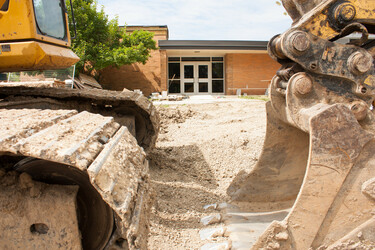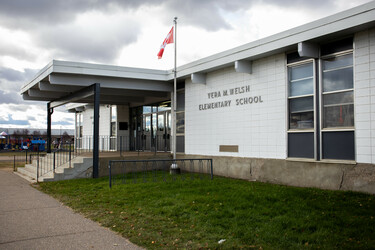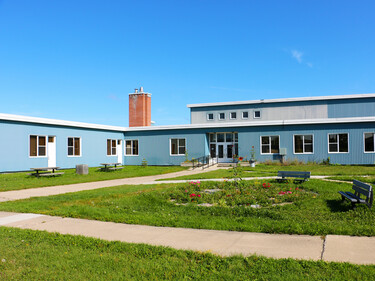The Northern Lights Public Schools Board of Trustees believes it is important for all stakeholders to work together to ensure all students have the opportunities and resources they need to learn and excel. The Board places a high priority on engaging with its stakeholders to better understand the needs of its students, their families, and our communities. Our trustees then advocate for those needs at the local, provincial and federal levels.
The Board also encourages students and parents to use their voices to advocate for public education and changes that will benefit all students.
Board Advocacy Priorities
The NLPS Board of Trustees has identified two advocacy priorities to focus on:
Advancing NLPS School Infrastructure Priorities
Access to Equitable Opportunities for Rural Students
The Board will also continue advocating on emerging and ongoing issues affecting NLPS students and staff.
- May 2025: Letter to the Minister of Indigenous Services re: Jordan's Principle
- February 2025: Letter to Minister of Education re: Provincial Data Collection
- December 2024: Letter to Minister of Education re: Funding Formula Challenges and Potential Solutions
- December 2024: Letter to the Minister of Transportation and Economic Corridors re: Highway 663
- July 2024: Letter from Minister of Education re: Transportation Funding
- June 2024: Letter to Minister of Education and Minister of Transportation and Economic Corridors re: Student Transportation Challenges
- November 2023: Advocacy the focus at ASBA fall general meeting
Advancing NLPS School Infrastructure Priorities

The Board's focus in this area will be on advocating for approval of the projects identified in its Capital Plan as well as the inclusion of Indigenous Spaces in new school construction projects.

The Facts
- The new school would be located adjacent to the Bold Centre, providing many programming benefits and encouraging community involvement.
- The current school is located next to railroad tracks that transport hazardous chemicals to and from oil and gas sites daily.
- An underground spring runs through the lower mechanical room.
- This project has been on the Board's Capital Plan for over 20 years.
- The five-year deferred maintenance costs are $11.8 million.
- A new school would be right-sized to enrollment.
Timeline
- Previously included in a design scope aimed at exploring a “Lac La Biche Solution” for school infrastructure needs.
- In March 2023, it was approved for design funding.
- A site adjacent to the Bold Centre was approved in September 2023 and finalized in April 2024.
- Design shared with the community in January 2025.
- Construction approval received in May 2025!
Next Steps
- The Board is looking forward to the start of construction and then celebrating the grand opening with the community!
Updates
- May 2025: Construction approved for Lac La Biche elementary school
- January 2025: Vera M. Welsh Elementary School project update
The design has been completed and the Board is waiting for Alberta Education to approve the project for construction in either the March provincial budget or through the School Construction Accelerator Program. - September 2024: Positive Progress made on Vera M. Welsh Elementary replacement project
NLPS representatives met with Education Minister Demetrios Nicolaides, Energy and Minerals Minister Brian Jean, and Bonnyville-Cold Lake-St. Paul MLA Scott Cyr to discuss the status of the project. - July 2024: Letter to the Minister of Education re: progress on Vera M. Welsh Elementary School and Project Summary
- March 2024: Board approves new capital plan
- September 2023: Vera M. Welsh replacement school update
Design plans for a replacement school for Vera M. Welsh Elementary School in Lac La Biche are moving forward again now that Lac La Biche County council has approved a site for the school. - March 2023: Design funding approved for Lac La Biche School
After more than 20 years of advocacy efforts, the NLPS Board of Trustees is excited to see that a replacement school for Vera M. Welsh Elementary was approved for design plan funding by Alberta Education.

The Facts
- The Board adjusted its capital plan in 2024 to include a comprehensive solution for its infrastructure needs in Cold Lake South. The plan had initially prioritized a replacement school for North Star Elementary School, but broader challenges expanded the scope to include Art Smith Aviation Academy and Cold Lake Junior High.
- Cold Lake schools were reconfigured in a three-year process that started in 2019 to alleviate pressure on schools in the north.
- Art Smith Aviation Academy is an alternative program located on 4 Wing Cold Lake in a building that was deemed “end of life” in 2006. Requesting modernization or replacement of the building is complex as it is a federally-owned building on federally-owned land. The Board continues to engage with Alberta Education, the Department of National Defence and the City of Cold Lake to explore solutions.
- North Star’s enrollment has exceeded projections since Cold Lake schools were reconfigured between 2019-2022, pushing the school near capacity and creating challenges for space, power, parking, play areas and gymnasium use.
- Cold Lake Junior High requires upgrades to address design flaws and reduce potential liability risks.
Timeline
- Approved for planning funding in March 2025. This will help define the scope of the project, explore potential sites, and prepare the project to meet the criteria to move on to the design phase.
Next Steps
- The Board will continue to work with the federal and provincial governments, 4 Wing Cold Lake and City of Cold Lake as the project moves forward.
Updates
- March 2025: Funding approved for Cold Lake South Solution
- March 2024: Board approves new capital plan
- September 2023: Letter to the Minister of Education re: Capital Plan and Art Smith Aviation Academy
The Facts
- Buffalo Lake Metis Settlement is the only Metis Settlement in Alberta that does not have a school located in its community.
- With the exception of students attending Crossroads Outreach School, all K to 12 students are bused or driven off of the settlement to attend school. The majority of K to 8 students attend Caslan School, with most high school students attending J.A. Williams High School in Lac La Biche.
- The distance from Caslan School to Buffalo Lake is a barrier to participation in extracurricular activities and deprives them of vital cultural and educational opportunities.
- Buffalo Lake Metis Settlement Council and NLPS have been advocating for a school for several years. They have had numerous discussions about ways to move forward with the project, and met with representatives from Alberta Education as well as Alberta Indigenous Relations.
- The Settlement has identified a site for a new school that is co-located with other community services, providing an opportunity for increased community involvement, extracurricular activities, and expanded community programming outside of school hours.
Timeline
- In March 2025 the project was approved for pre-planning funding. This will be used for community consultation and to help determine the project scope.
Next Steps
- NLPS will continue to work with Buffalo Lake Metis Settlement Council to advocate for the project and prepare it to move to the next phase.
Updates
- March 2025: Pre-planning funds approved for Buffalo Lake Metis Settlement School
- December 2024: Letter of Support - Buffalo Lake Metis Settlement
- March 2024: Board approves new capital plan
- March 2021: Capital Plan updated
The Facts
- Approximately 34% of NLPS students self-identify as First Nations, Metis or Inuit. This number is higher at some schools and in some communities. For instance, at Vera M. Welsh Elementary School in Lac La Biche, which is currently in the design phase for a replacement school, 50% of students self-identify as First Nations, Metis or Inuit.
- Opportunities for students to take part in cultural activities, see their culture reflected in their schools, connect with Elders, as well as increased community participation in schools, has been shown to positively impact attendance, academic achievement, graduation rates, and a sense of belonging.
- Alberta Education does not currently allocate funding or space for Indigenous spaces in new school builds. This means that Boards who wish to incorporate space for Elders or smudging or community-based supports must reduce or reallocate space from other areas of their design. For instance, reduce the size of a library or choose between a cultural space or a sensory room.
Next Steps
- The NLPS Board of Trustees is drafting a position statement to submit to the Alberta School Boards Association to jointly advocate with other boards across the province for Indigenous Spaces to be funded and included in new school construction.
Updates
Access to Equitable Opportunities for Rural Students
In addition to continuing to advocate for a new funding model from Alberta Education that addresses the challenges experienced by rural school divisions, the Board is also focusing on the following topics related to this issue:
-
Staff Recruitment and Retention
-
Student Transportation
-
Student Wellness
-
Full-Time Kindergarten
-
Dual Credit and Career Pathways Programming
Funding Facts:
- The funding provided by Alberta Education has not increased at the same rate as the cost to educate students.
- In 2018-2019, NLPS spent $14,092 per student FTE.
- By 2023-2024, spending had increased to $16,884 per student FTE.
- During the same time period, 2018-2019 to 2023-2024, funding from Alberta Education increased from $13,301 per student FTE to $13,818 per student FTE.
- NLPS has been using reserves to maintain services to students and families, including full-day programming for Kindergarten students, class sizes that meet ACOL recommendations, and mental health services.
Updates
How Can I Help?
Northern Lights Public Schools values the voice of students and parents/guardians in advocating for public education.
There are many ways stakeholders can get involved in advocacy:
- Write a letter or email to your elected officials. Include information about the impact the issue is having on your child and/or family and please cc your letter to our Board Chair. Feel free to use any of the information on this page. If you need more information, contact us and we will be happy to help.
- Join your school's School Council. You will have the opportunity to provide feedback to your child's school and the Board that will help us with our advocacy efforts. Additionally, through your school council, you can become part of the Alberta School Councils' Association, which advocates for education on behalf of parents.
- Take part in Parent Engagement opportunities with your child's school, the Board, and the provincial government. There are numerous opportunities to complete surveys, provide feedback, and take part in online or in person engagement sessions.
Premier of Alberta
Danielle Smith
premier@gov.ab.ca
780.427.2251
Minister of Education
Demetrios Nicolaides
education.minister@gov.ab.ca
780.427.5010
Athabasca-Barrhead-Westlock MLA
Glenn van Dijken
Athabasca.Barrhead.Westlock@assembly.ab.ca
780.674.3225
Bonnyville-Cold Lake-St. Paul MLA
Scott Cyr
Bonnyville.ColdLake.StPaul@assembly.ab.ca
780.826.5658
Fort McMurray-Lac La Biche MLA
Brian Jean
FortMcMurray.LacLaBiche@assembly.ab.ca
780.588.7979
Fort McMurray-Cold Lake MP
Laila Goodridge
laila.goodridge@parl.gc.ca
780-743-2201
Lakeland MP
Shannon Stubbs
shannon.stubbs@parl.gc.ca
780-657-7075
How the Board Advocates for Students
The Board uses a variety of strategies to advocate for NLPS students.
- The Board connects with local MLA's, the Minister of Education and other cabinet ministers to share concerns, request assistance, and suggest solutions.
- The Board meets with local MP's and federal government representatives to share concerns and explore solutions.
- The Board generates dialogue with other local school boards to discuss mutual concerns, explore local solutions, and plan joint advocacy efforts.
- The Board colaborates with local municipal leaders to share information and discuss ways municipalities and school boards can work together to benefit schools and communities.
- The Board builds relationships with local First Nations and Metis Settlement leaders and Elders to share information and identify ways to collaborate to benefit students and communities.
- NLPS is part of the Alberta School Boards Association which advocates for all students at the provincial level. Through ASBA, NLPS collaborates with other school boards across the province, can bring forward resolutions that are used as the basis for the organization's advocacy, and explores solutions at the provincial level. In the past, NLPS trustees have served on the ASBA Board of Directors, including as ASBA President.
- NLPS is also part of the Public School Boards' Association of Alberta which advocates for public schools in the province. This is an opportunity for trustees to meet with other public school trustees and discuss issues, put forward resolutions and collectively advocate for students at the provincial level. In the past, NLPS trustees have served on the PSBAA Board of Directors, including as PSBAA President.
- At the local level, the Board also engages at every opportunity with local community organizations to discuss mutual concerns and ways to work collaboratively to benefit students.
- Trustees attend school council meetings when requested and keep school councils informed of education issues and advocacy. At least once per year, the Board meets with school councils representatives on a regional basis. The Board supports the advocacy efforts of school councils.
- The Board engages students, parents and guardians, and the community in discussions about education issues and uses the feedback it receives in its advocacy efforts. For example, in 2022 the Board offered parents and guardians the opportunity to participate in a Mental Health Survey for Parents. The data collected has been used to advocate for increased mental health resources in our schools and improved access to mental health services in our communities.
